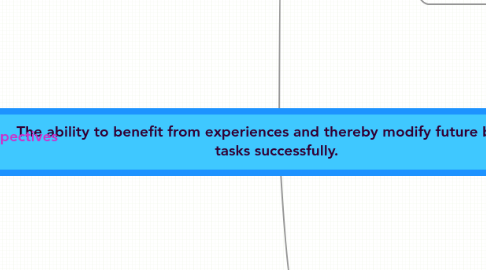
1. Theoretical Perspectives
1.1. Spearman's g theory
1.1.1. Intelligence comprises of both a single, pervasive reasoning ability (general factor) that is used on a wide variety of tasks and number of narrow abilities (specific factors) involved in executuing tasks.
1.2. Cattell's theory
1.2.1. Two distinctly different components of genral intelligence.
1.2.1.1. Fluid Intelligence: Ability to aquire knowledge quickly and adapt to new situations.
1.2.1.2. Crystallized Intelligence: knowledge and skills they have accumulated from their experiences and schooling.
1.3. Gardner's Multiple Intelligence Theory
1.3.1. People have several more specific abilities, or multiple intelligences, that are relatively independent of one another.
1.3.1.1. Linguistic intelligence: Ability to use langauge effectively.
1.3.1.2. Logical-mathematical intelligence: Ability to reason logically, especially in mathematics and science.
1.3.1.3. Spatial intelligence: Ability to notice details of what one sees and to imagine manipulate visual objects in one's mind.
1.3.1.4. Musical intelligence: Ability to create, comprehend, and appreciate music.
1.3.1.5. Bodily-kinesthetic intelligence: Ability to use one's body skillfully.
1.3.1.6. Interpersonal intelligence: Ability to notice subtle aspects of other people's behaviors.
1.3.1.7. Intrapersonal intelligence: Awareness of one's own feelings, motives, and desires.
1.3.1.8. Naturalist intelligence: Ability to recognize patterns in nature and differences among natural objects and life-forms.
1.4. Sternberg's Triarchic Theory
1.4.1. Intelligent behavior involves an interplay of three factors, all which may vary from one occasion to the next.
1.4.1.1. Environmental context: In which the behavior occurs.
1.4.1.2. The way in which one's prior experiences are brought to bear on a particular task.
1.4.1.3. Cognitive processes required by the task
2. Questions
2.1. How can educators teach to a wide number of intelligences in a classroom?
2.2. Can parents help promote a specific type of intelligence in their child?
2.3. How can we promote and expand a child's intelligence?
3. How children acquire knowledge
3.1. Hereditary Influences
3.1.1. Intelligence may be partly an inherited characteristic.
3.2. Environmental Influences
3.2.1. Environmnetal conditions, including home environment , nutrition, toxic substances, enriching preschool programs, and formal schooling can have a significant influence on intelligence and IQ scores.
3.3. Parenting
3.3.1. Family income, occupation, parental behaviors, and level of education also play a role in children's intelligence.
